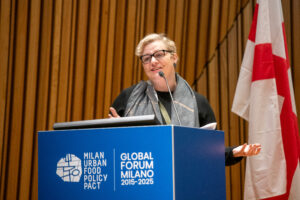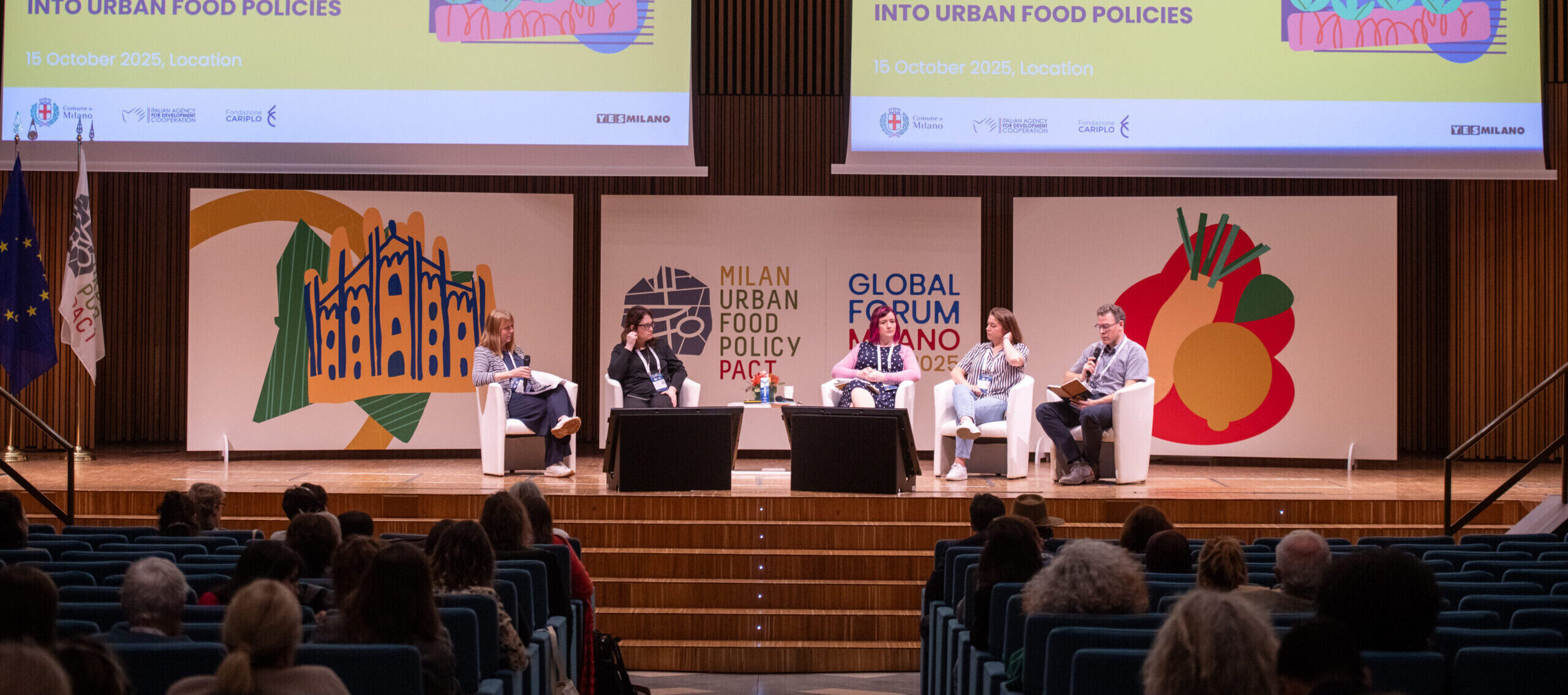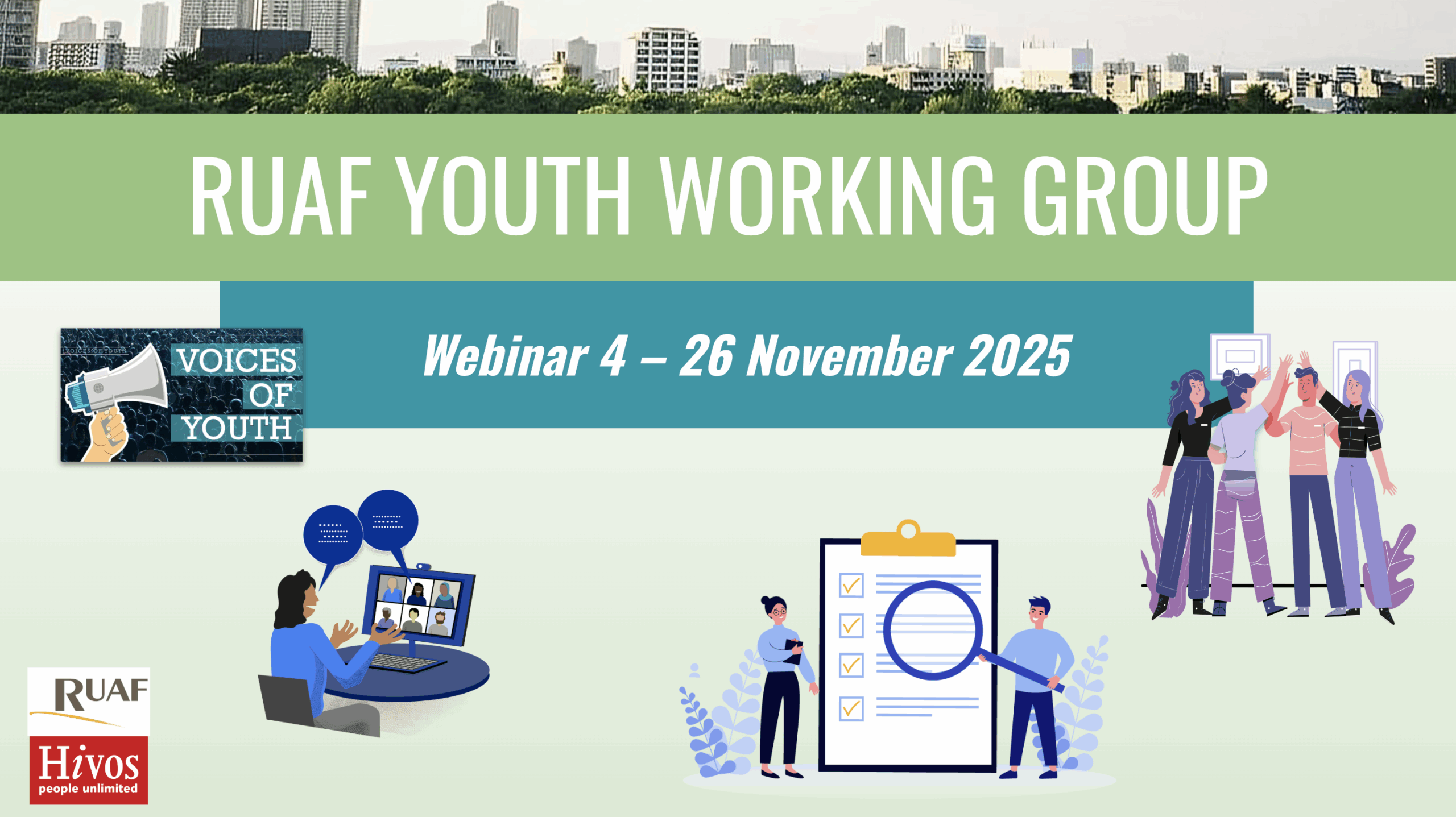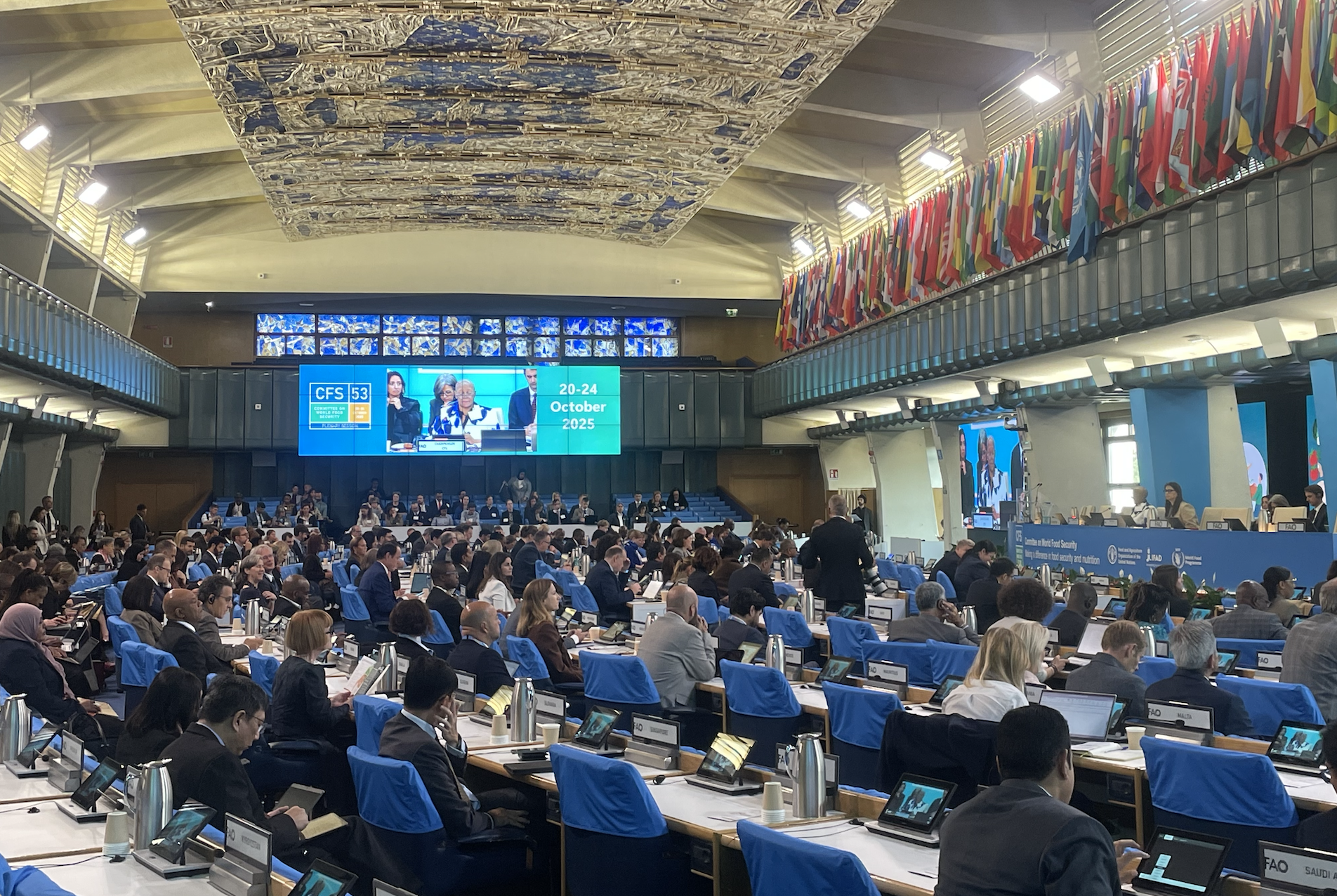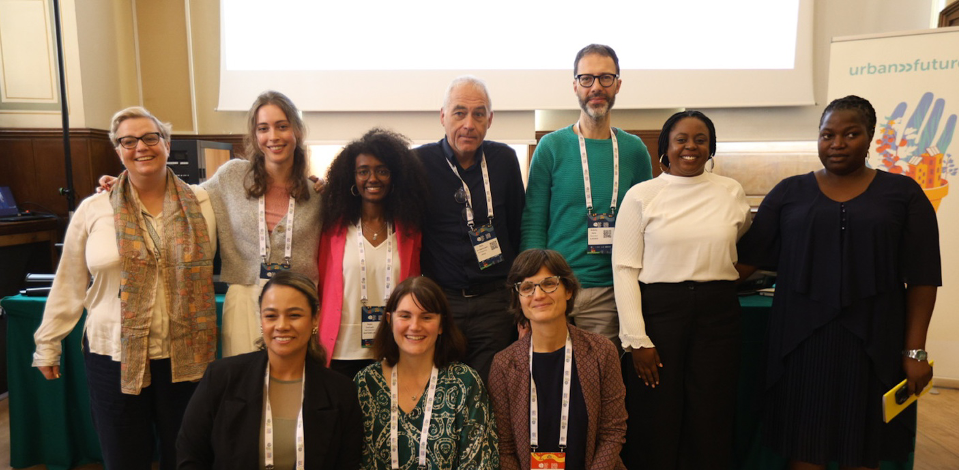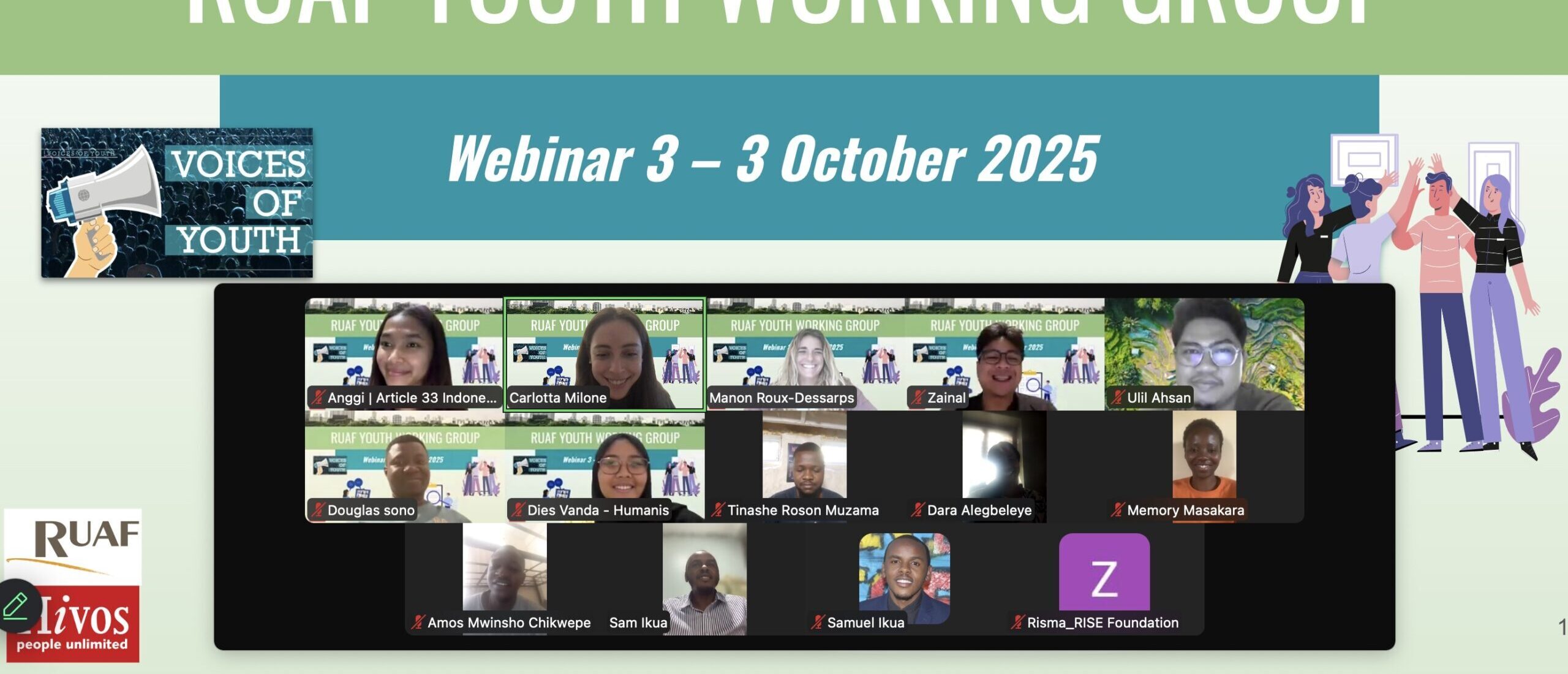New and adapted actions and indicators to help cities integrate climate mitigation and adaptation into urban food policies received formal endorsement at the Milan Urban Food Policy Pact (MUFPP) Global Forum in Milan, following presentation at a parallel event organized by RUAF, Red de Municipios por la Agroecología (RMAe) and FAO. The news means the revisions and additions are set to be incorporated into the Framework for Action and Monitoring Framework of the Pact, which all signatories are recommended to adopt.
The year 2025 marks ten years of the MUFPP, a journey RUAF has supported since the beginning – first through involvement in drafting the Pact and subsequently by leading the development and piloting of the Monitoring Framework, together with FAO and the MUFPP Secretariat. As climate change increasingly threatens urban food security and public health, cities need updated tools that connect food and climate policy more effectively.
Recognizing the deep connection between the climate crisis and food systems, the new actions and indicators – which were developed by RUAF with RMAe and the MUFPP Secretariat – were formally endorsed by cities as part of the Milan Declaration, unveiled by Vice Mayor Anna Scavuzzo on World Food Day.
Read more about the tool and access it here.
Parallel event: advice from cities
The endorsement followed a parallel event, led by RUAF on the third day of the MUFPP Global Forum, which showcased the new tool on climate mitigation and adaptation, shared lessons from the pilot in Barcelona, and hosted a lively panel discussion with city representatives. Representatives from Porto Alegre, Birmingham and Ghent, explained how their cities are monitoring progress and responding to the impacts of climate change.
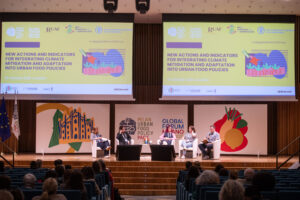
The experiences shared by Porto Alegre, Birmingham and Ghent offered powerful reminders of how different cities — each with its own context— are finding successful ways to link food and climate action, despite challenges. Reflecting on the session, rapporteur Alessandra Manganelli (University of Barcelona) identified common themes that emerged from the discussion, pointing to what cities need most to advance this work:
1. Build on what already exists. Cities do not need to start from scratch. Instead, they can focus on coherence — connecting existing actions, departments and community initiatives under a shared framework. This helps strengthen alignment and reduce duplication of efforts.
2. Frame strategically. Positioning food within broader climate or health agendas helps attract political support, align priorities and move food policy from a niche concern to a central element of resilience.
3. Encourage experimentation and peer learning. Working across city agendas can be complex and even create tensions, but piloting and testing new approaches allows cities to learn quickly, share lessons, and inspire other municipalities to replicate and adapt successful models.
Inside the session
The session, facilitated by Jess Halliday (RUAF), opened with remarks from Guido Santini (FAO), who highlighted the importance of indicators and reflected on the joint FAO–RUAF–MUFPP track record in developing them. He explained how this new tool complements the Milan Pact framework, fills existing gaps, and aligns with the mandate of FAO’s Green Cities Initiative.
Next, Cecile Michel (MUFPP Secretariat) provided the political context behind the tool’s creation, noting that cities applying for MUFPP Awards are now encouraged to demonstrate use of these indicators. This ensures a common language for monitoring and accountability.
Maria Carrascosa Garcia (RMAe) then presented the tool’s objectives, methodology, outcomes, and development process, emphasizing its participatory nature. Experiences of three pilot Spanish cities – Barcelona, Granollers and Rivas – that tested the tool in real-world conditions were incorporated in the draft, and signatory cities of the MUFPP were invited to feedback on it.
The pilot experience and results from Barcelona were shared by Maria Tarafa, Urban Food Policy Officer (Barcelona City Council), followed by a panel moderated by Joy Carey (RUAF) featuring Olivia Bertolini Monteiro from the city of Porto Alegre, Sarah Newton from the city of Birmingham, Sarah Bruinaars from the city of Ghent, and Thom Achterbosch, Senior Researcher at Wageningen Economic Research. The panelists discussed how their cities are tackling climate change through food system action, and how monitoring supports progress and learning.
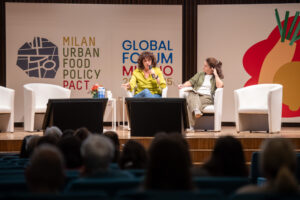
Porto Alegre (Brazil)
Recent floods underscored the value of integrating agroforestry systems into urban areas. These gardens protect the soil through natural leaf cover and help landscapes recover more quickly after flooding. Many of these gardens supply organic produce for school meal programmes, linking ecological recovery with social and nutritional benefits. Yet, as Olivia Bertolini Monteiro emphasized, the challenge is not only to create gardens, but to sustain them. Long-term maintenance requires community involvement and awareness, working closely with residents to build a shared sense of responsibility.
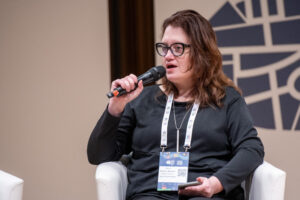
Birmingham (UK)
Birmingham’s story shows how cities can build on existing initiatives, connecting people who are already taking action rather than starting from scratch. Birmingham reviewed several international monitoring frameworks to anchor its food strategy in solid evidence, adapting them to local conditions and producing a single, citywide framework. This means that no matter who is working on the food system — from health officers to procurement staff — everyone uses the same set of metrics. The city treats monitoring as a dynamic and participatory process, focused not just on numbers but also on relationships, learning, and shared responsibility, thereby helping to capture valuable qualitative information that might otherwise be missed. Birmingham also recognizes the value of structure and support: a dedicated food systems team oversees data collection and collaborates with universities to determine what can and cannot realistically be measured. Through this approach, the city keeps monitoring flexible and iterative.
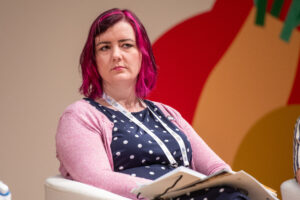
Ghent (Belgium)
Ghent’s work on food and climate focuses on public procurement and behavioural change, guided by positive messaging around “delicious food” rather than climate action to reduce resistance and keep engagement growing. Key actions across public catering include shorter supply chains, Thursday Veggie Day, the exclusion of tuna from menus, and a target of 50 percent plant-based meals each day. Though the city no longer has an integrated food strategy, it maintains a strong procurement framework and a decentralized food governance model, coordinated through a citywide task force. As a signatory to the Cool Food Pledge, Ghent committed to cut food-related greenhouse gas emissions by 25 percent by 2030 – and has already achieved a 38 percent reduction since 2018. The city communicates this progress through simple, colour-coded visuals, making complex data accessible to citizens.
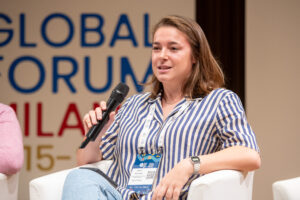
Wageningen University (Netherlands)
From a research perspective, Thom Achterbosch reflected on lessons from the FoodTrails programme, emphasizing that indicators should not serve accountability alone, but also a learning agenda. He stressed that monitoring should help cities understand how change happens, not just whether targets are met. Thom Achterbosch also noted that while frameworks build credibility and political momentum, they need to be translated and contextualized so that each city can make them meaningful to its own reality (an approach recommended by RUAF for cities using the MUFPP Monitoring Framework). He highlighted the importance of combining quantitative and qualitative indicators to maintain a “rich picture” of system change. For example, using participatory methods — such as a theory of change — allows cities and practitioners to co-design indicators, making them more relevant and actionable.
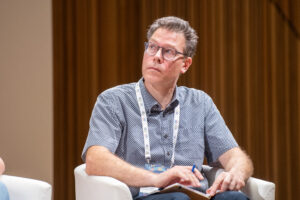
Challenges and way forward
During the discussion, participants noted that time and capacity are often the biggest challenges for local governments. Monitoring takes sustained effort and must compete with other priorities. Panelists recommended partnering with universities or external experts to help design, interpret, and apply indicators, making monitoring more manageable and effective.
RUAF consultants are available to guide cities in identifying locally-relevant actions and indicators, and developing tailored monitoring frameworks for their contexts.
Access the tool here: Integrating climate mitigation and adaptation into urban food policies.
